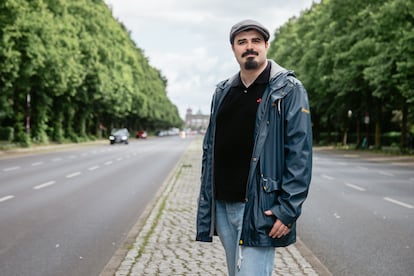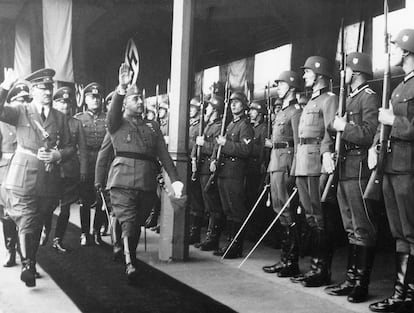National Socialist Germany felt curious about the origins and character of Francisco Franco, the general who led the coup side in the civil war in Spain and to which Berlin already provided an invaluable military support. It was the end of 1936. So, when a Bolivian diplomat admirer from Adolf Hitler contacted the German authorities to point out that his Spanish ally would be “Jew”, the anti -Semitic regime that would perpetrate the holocaust took note with interest.
“For the sake of importance, the previous report is processed without it being possible to verify its accuracy,” reads a document sealed in office II 112, responsible for investigating and chasing Jews in the so -called SD, the Reichsführer security service of the SS, Heinrich Himmler. The document, dated December 16, 1936, adds: “We will try to make more inquiries in this direction.”
It is not known if Himmler or the head of the SD, Reinhard Heydrich, gave continuity to the signal of the Bolivian diplomat, which was called Federico Nielsen-Reyes and had been the translator of the first edition in Spanish of Hitler’s book, My fight (My fight). But the document, found in the Federal Archive of Berlin by historian Marc Navarro (Barcelona, 35 years) reflects the obsession of the Nazi regime and its supporters for the racial issue. And it highlights the contradictions in which they could place them, in their international relations, anti -Semitic fanaticism.
In 1936, Hitler’s Germany already applied racial laws against Jews. There were two years for the pogrom of November 1938 and some more so that the call was fully launched Final solution and the systematic murder of six million European Jews. At the same time, as historian Julián Casanova explains in the biography Franco (Criticism, 2025), the Nazis had chosen Franco, since a few days after the coup on July 18 against the Second Republic, as their privileged interlocutor among the general generals in Spain.

“The third Reich authorities that negotiated with Franco the loan of war material pressed him since the end of August to take the reins,” writes Casanova. It soon occurred. In the fall of 1936 he was appointed Head of Government of the Spanish State and Germany recognized the coup plotters as a legitimate government of Spain. Berlin had already delivered war airplanes, weapons and ammunition that would serve for the first assault to Madrid, and sent Spain to the combat group known as the Condor Legion.
If it had been true what Nielsen-Reyes pointed out, that Franco was Jewish, how could Hitler have to hold the strong alliance with him? The Bolivian was a diplomat who held charges in Olympism, was in contact with war criminals in Latin America and, in its most picturesque appearance, it looks like a character in Roberto Bolaño’s book Nazi literature in America. SEguramente knew that, in that decisive year in the history of Spain and Europe, it played a sensitive point.
“Subject: General Franco. Spain,” says the heading of the Office II 112. And follows: “According to information available here, Mr. Nielsen-Reyes, of the Bolivian mission in Berlin, argues that the head of the Spanish National Government, General Franco, would be Jewish.” He adds that a news of a Swiss Catholic newspaper “makes the same statement”, according to which “Franco would be a descendant of the Marranos”, the name received by the Jews converts suspected of secretly practicing Judaism. The document, signed with an initial by one “C.”, concludes with the purpose of “making more inquiries in this direction.”
When Marc Navarro discovered the role in the Federal Archive of Berlin, one of those lived Moments Eureka which are unstable for any historian accustomed to dealing with arid bureaucratic documents in tedious sessions between folders and microfilmes. It happened in mid -2023 while investigating the doctoral thesis that defended last December at the University of Barcelona, entitled The Embassy of Spain in Berlin, 1931-1945. “I don’t know if it’s really unpublished or not, I can’t put my hand in the fire either,” he says, “but it is the first time I have seen or heard about it.” He announced the finding during a conference at the same embassy, on May 15, about Spanish diplomats and shoah.
“When I found it it was a small joy, because they are things that one has read in other authors, things about which it was speculated, whether or not Franco had Jewish roots, as it has also been speculated for many years about whether or not it was a mason,” he explains. “This document absolutely proves anything, but it served me to show that, beyond the rumor, more than one took it seriously, to the point of, in quotes, inform or disturb the SS with the subject.”
According to Marc Navarro’s analysis, what could happen was the following: “Although I cannot confirm it, I am sure that (Nielsen-Reyes) wrote or warned all possible people, especially knowing the bicefalia of the German state between government institutions and the Nazi party. In any case, I am sure that both the party and the Naz government received this information, in one way or another.”
The role found by Navarro documents a possibility that specialists had contemplated and quoted in their works. In The Holocaust and Franco’s Spain (Turner, 2022), Enrique Moradiellos writes: “Already during World War itself, that rumor on the Hebrew ancestry of Franco’s family circulated through the European diplomatic areas and came to disturb Hitler himself at some point.” Gonzalo Álvarez Chillida, in Anti -Semitism in Spain (Marcial Pons, 2002), explained that, according to the journalist and historian Ramón Garriga, “it seems that Heydrich ordered an investigation on the subject although he did not work any.”
Federico Nielsen-Reyes, the man who transmitted to the Nazis that Franco could be Jewish, was not any diplomat, but someone close to the regime in Germany, his father’s country. He was born in La Paz in 1904. He would die in Madrid in 1987. The first Spanish edition of Mein Kampfpublished in the POLITICAL STUDIES MAGAZINE In 2019.
Cap establishes that Nielsen-Reyes is the author of the non-signed translation of My fight To Spanish, published in 1935 in Barcelona by the Araluce Editorial House and, two years later, in Ávila for the editorial of the National Workers Socialist Party, the Nazi party. There were versions of fragments of Hitler’s work, but this is the first authorized and published as a book, although in an abbreviated version. On the website of the Belgian auction house Arenberg, there is an original specimen of the book with a dedication to the Bolivian industrialist and emissary in Paris Simon Iturri Patiño, dated August 1936. “How much is missing in our homeland think, feel and work as the great driver of this town Adolfo Hitler has done in Germany,” he writes. Signs as “F. Nielsen-Reyes, book translator.”
That Nielsen-Reyes was a convinced Nazi is accredited by a memorandum received by the president of the USA Franklin Roosevelt in 1942, and who also quotes cap, in which he is described as “a great Nazi propagandist in South America.” Another author, the German Dieter Maier, indicates, in a text published in 2024, that Nielsen Reyes crossed at some point, surely in the late fifties or early sixties, with the Nazi criminal Walther Rauff.
Rauff is one of the protagonists of the last book of the jurist and writer Philippe Sands, London Street 38. Two cases of impunity: Pinochet in England and a Nazi in Patagonia (Anagrama, 2025). After World War II, he fled to Latin America and worked for a time for the Bundesnachrichtendienst (BND), the intelligence services of Western Germany. Although he was installed in Patagonia, his contacts reached Bolivia. Maier quotes a message to the BND in which Rauff writes, referring to Nielsen-Reyes and in terms that seem praiseful, as if he gave a seal of credibility: “He has translated My fight In Spanish. Still today is a follower of Hitler. ”
During his investigation in the Federal Archive, Navarro found another document of the same time as Nielsen-Reyes on Franco’s supposed Jewish origin. It is a letter dated November 29, 1936 and addressed to the “HEAD ESTIMATED Mr. Reichsführer de las SS”. The Erich Baumeister firm, collaborator of Lorenz Mensch, a trusted man of Himmler, for whom he prepared horoscopes of people of interest.
The letter, from which the journalist Udo Röbel had already echoed a few years ago, is hardly readable, but he deduces from her that informs Himmler that an “astrological study” on Franco is being prepared. The fans of some Nazis, including Himmler, is known for the occult. “My observations are intended to be a totally objective and non -partisan statement on the subject of Spain,” promises the astrologer.
“With the astrological study,” Marc Navarro observes, “it is already seen that (Nielsen-Reyes) is not the only document interested in Franco’s figure, with his origins or with his most immediate future in the context of war.” Nor is it known, in this case, what the Nazis did with the horoscope, or what it would have served them. About the complaint From Nielsen-Reyes, Navarro says: “I cannot demonstrate or affirm that it continued to be processed.” But he adds: “I don’t think they would get to any determining conclusion, because I don’t think it was possible.” In addition, the economic and military benefit that Germany brought from its relationship the Francoist side was such that “arriving at this point it already gave the same.”
It was what was what Nazi Germany discovered after the letters of the late 1936, Hitler’s support did not stop. Military aid continued and the Condor Legion bombed Gernika in April 1937. In May 1939, celebrating victory in the war, Franco called to be alert against “the Jewish spirit that allowed the alliance of the great capital with Marxism,” as Julián Casanova recalls in his biography. The dictator would align with Hitler in World War II, although Spain would not go into combat. The biographer recalls that “the main Nazi hierarchs did not positively value Spanish belligerence, because they considered it an economic and military burden.”
This was the context of the Hitler-Franco summit on October 23, 1940 in Hendaya, which Casanova describes: “Hitler did not go to Hendaya to ask Spain to enter the war and Franco made a long review of the Spanish claims in Morocco, the bad material conditions in which the country was and the list of supplies he needed for his military intervention.” What, finished the interview, Franco told its Foreign Minister Ramón Serrano Suñer, referring to the Germans: “These people are intolerable. They want us to enter the war in exchange for nothing.” Admiral Wilhelm Canaris, head of the German Secret Service, considered that Franco was not “a hero but a small Mequetrefe.” In spite of everything, as Casanova recalls, “Franco did not break relations with the third Reich until May 8 (from 1945).” That is, the day of the capitulation of Germany.
And Nielsen-Reyes? If at any time, as the Office Document II 112 seems to indicate, he housed doubts about Franco, changed his mind. Professor Casquete quotes in his article the prologue of the second edition in Spanish of My fightpublished in Ávila in 1937. The Bolivian diplomat writes that, in Spain, “the Generalissimo Franco holds denoded struggle to save his glorious people from the communist claw.” If there was a case about Franco’s Judaism, he was soon archived.

